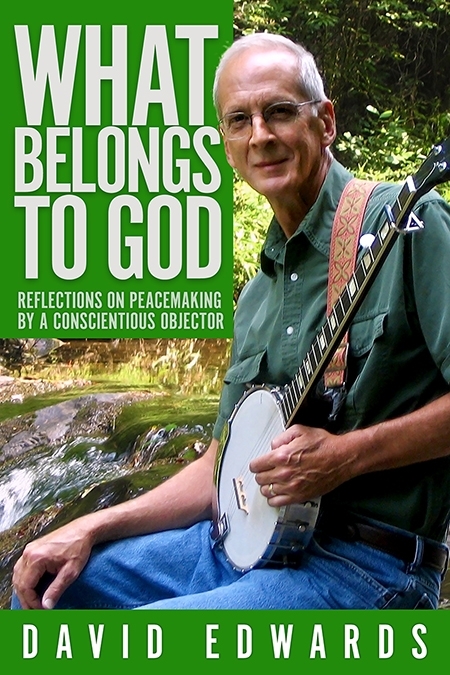
The two great problems of our society are a lack of conscience and the intentional violence toward those we have rendered socially invisible. David Edwards, in these pages, renders a powerful moral critique of these two problems and calls readers to maintain their commitment to nonviolence, love, and truth.
~ The Rev. Dr. William J. Barber II, president of Repairers of the Breach, and co-chair of the Poor People’s Campaign
Amazon Book Reviews
The promotion of a book and its message is supported when readers write a review. When you have read What Belongs to God, please consider sharing your affirmation on Amazon.com. Amazon does not require that you bought the book there, just that you have an account. Use the buttons below to see what others have written, and you can easily add your own review.
WHAT BELONGS TO GOD
Reflections on Peacemaking by a Conscientious Objector
By David Edwards
David Edwards’ What Belongs to God: Reflections of a Conscientious Objector arrives at a time when the issues of nationalism, militarism, and violence are ever-present and unavoidable challenges in the United States and throughout the world. In a brief, compact volume, Edwards argues passionately for the thesis that “nonviolence, refusing to kill, forgiving one’s enemies, is the life for which we are all made.” – A review by Bob Hill as it appears on Amazon.com.
Edward traces the evolution of his decision to declare for Conscientious Objector status with the Selective Service System during his college years at Lynchburg College in Virginia (during the waning years of the Vietnam War) and outlines how that choice marked the trajectory for the rest of his life. He offers poignant remembrances of his alternative service in Boston Children’s Hospital, stories of engagement with issues of war and peace in the four congregations he served in his pastoral career, and deep grappling with questions about to what and to whom one can and should offer one’s premier loyalty and allegiance. Throughout the telling of his story, Edwards includes wisdoms and inspirational insights from Buddhism and Islam, in addition to those he has claimed in his foundational commitments as a Christian. In one of the thicker chapters, he provides unflinching treatment of both Hebrew and New Testament texts regularly cited in debates about the “cozy blend of nationalism and soft-core militarism,” pacifism, loving one’s “enemies,” and the effects of nationalism infused into an overwhelming swath of U.S. religion.
In this posthumously published effort – he died in 2019 – Edwards has proffered a rare and uncommon blessing: a valediction which his family, friends, and former church members will treasure for years to come. Along with that gift is another: an urgent prompting for contemporary souls to be brave and fulfill their yearnings for greater clarity and better congruence between what their faith ultimately teaches them about killing and what they actually practice.
Some will find this book too challenging for their life-long (some might say encrusted) preferences. Others will be gladly heartened that such a soul as David Edwards has shown them that they are not alone in their chosen paths and that “… the way of being a true human being, as we are created to be, does not include violence, war and killing.” In the end– to use the journalistic aphorism eventually taken up by Dorothy Day – Edwards has accomplished in this book what he accomplished in his life and ministry: “to comfort the afflicted and afflict the comfortable.” – Bob Hill
Study Guide
CHOOSING PEACE
A Discussion and Action Guide for What Belongs to God
By Kaye Edwards and Jason C. Stanley
A study guide has been developed to spark self-examination and community action on peace-and-justice issues in today’s world. Click here to find out more about Choosing Peace and free study guide resources.

What belongs to God is a testimony that will inspire another generation to find the courage to value all life. There is so much in this book. It is a manual on character, a guide to decision-making, a testimony to the cause of justice, and an affirmation of the dedication to serving one’s brother and sister in love.
Shaykh Ahmed Abdur Rashid, founder of The World Community spiritual center in Virginia.
This book is a wonderful articulation of the spiritual basis of nonviolence. It provided words for some of the spiritual convictions I have held, but never have been able to explain adequately.
Janaki Spickard Keeler, coordinator of pamphlets at Pendle Hill Quaker Center.
David Edwards brings his personal experience and profound exegesis of core Bible passages together to address questions that every young person, indeed every Christian, should ask themselves in these times of American empire. His thoughtful responses to the radical demands of the Prophets and the Gospel bring much light to bear on the matter of discipleship. This is a beautiful account of his journey to ethical maturity.
The Rev. Dr. Dick Hamm, former General Minister and President of the Christian Church (Disciples of Christ) in the U.S. and Canada.